
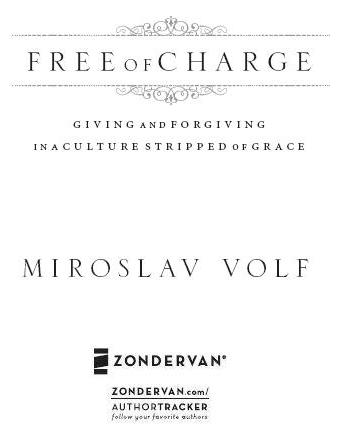
ZONDERVAN
FREE OF CHARGE
Copyright 2005 by Miroslav Volf
All rights reserved under International and Pan-American Copyright Conventions. By payment of the required fees, you have been granted the non-exclusive, non-transferable right to access and read the text of this e-book on-screen. No part of this text may be reproduced, transmitted, down-loaded, decompiled, reverse engineered, or stored in or introduced into any information storage and retrieval system, in any form or by any means, whether electronic or mechanical, now known or hereinafter invented, without the express written permission of Zondervan.
ePub Edition June 2009 ISBN: 0-310-86206-X
Requests for information should be addressed to:
Zondervan, Grand Rapids, Michigan 49530
Library of Congress Cataloging-in-Publication Data
Volf, Miroslav
Free of Charge : giving and forgiving in a culture stripped of grace : the Archbishops official 2006 Lent book / Miroslav Volf.
p. cm.
Includes bibliographical references.
ISBN-13: 978-0-310-26574-0
1. Generosity Religious aspects Christianity. 2. Forgiveness Religious aspects Christianity. I. Title: Archbishops official 2006 Lent book. II. Title.
BV4647.G45V65 2006
241'.4 dc22
{B}
2001017679
Miroslav Volf asserts the moral right to be identified as the author of this work.
All Scripture quotations, unless otherwise indicated, are taken from the New RevisedStandard Version Bible, copyright 1989, Division of Christian Education of the National Council of the Churches of Christ in the United States of America. Used by permission. All rights reserved.
The website addresses recommended throughout this book are offered as a resource to you. These websites are not intended in any way to be or imply an endorsement on the part of Zondervan, nor do we vouch for their content for the life of this book.
All rights reserved. No part of this publication may be reproduced, stored in a retrieval system, or transmitted in any form or by any means electronic, mechanical, photocopy, recording, or any other except for brief quotations in printed reviews, without the prior permission of the publisher.
06 07 08 09 10 11  19 18 17 16 15 14 13 12 11 10 9 8 7 6 5
19 18 17 16 15 14 13 12 11 10 9 8 7 6 5
To Nathanael and Aaron, my sons

gifts generously given,
givers adorably giving,
offenders easy to forgive,
forgivers hard to match.
Contents
FOREWORD BY
DR ROWAN WILLIAMS,
ARCHBISHOP OF CANTERBURY
This is a book about worshiping the true God and letting the true God act in us. It tells us as plainly as possible that the true God is a God who cannot stop giving and forgiving, and that our knowledge of this true God is utterly bound up with our willingness to receive from the hand of God the liberty to give and forgive.
Miroslav Volf, one of the most celebrated theologians of our day, here undertakes not just to explain the doctrines of the Christian faith but to persuade us that this God is supremely worth trusting. He offers us a unique interweaving of intense reflection, vivid and painfully personal stories, and sheer celebration of the giving God. He writes with enormous sensitivity to possible objections, to the ways in which what he says may sound hollow or insensitive, and incorporates a real element of dialogue into his argument. In that sense, this is a book that engages its readers with great force and immediacy.
I cannot remember having read a better account of what it means to say that Jesus suffered for us, in our place. And his analysis of the challenges Christian forgiveness faces in a society that is both sentimental and profoundly unforgiving is something that ought to be required reading for anyone seeking to understand the Western world in this sour and anxious age. Some of his turns of phrase will stick like burrs in the mind: Without sin we should be like God in the way that baby bears are like mother bears; God gives and loves by nature as surely as a duck quacks by nature Gods love isnt some kind of acquired skill. And the sensitive use both of his own experience as a parent, and of his and his familys life in one of the places in Europe most haunted by diabolical violence gives a depth to his meditations that is of rare quality.
In his concluding Conversation with a Skeptic, Miroslavs doubtful partner in the conversation admits that the God of the book is a pretty good god as gods go, the only trouble being that I cant believe in any of them. Miroslav responds by gently inviting the skeptic to think what it means if such a picture of God is so deeply in tune with the skeptics sense of what a healed and beautiful human life looks like, and at least to give serious time to absorbing the vision. The whole of this remarkable book constitutes an invitation to such absorption an invitation that should be equally powerful for the believer and the unbeliever. For all its quiet depth, it is proclamation of the most urgent and moving and, I hope, converting kind.
Dr Rowan Williams
Archbishop of Canterbury
The first thing I saw was a tear a huge, unforgettable tear in the big brown eye of a ten-year-old girl. Then I saw tears in her mothers eyes. And in all these tears, just enough joy was mixed with pain to underscore that pains severity: their joy at seeing him, their three-month- old brother and son, and their intense pain that it was the first time theyd seen him since he was just two days old, when theyd kissed him good-bye. I sensed in those tears the ache that he, flesh of their flesh, was being brought to them for a brief visit by two strangers who were now his parents, and the affliction of knowing that the joy of loving him as a mother and sister would never be theirs.
The joy and the pain of those tears led me to a repentance of sorts. My image of mothers who relinquished their children for adoption, though not as bad as that of the fathers involved, was not exactly positive either. I could not shake the feeling that there was something deficient in such an act. The taint of abandonment marred it, an abandonment that could be understandable and was certainly tragic, but abandonment nonetheless. To give ones child to another, it had seemed to me, was to fail in the most proper duty of a parent: to love no matter what.
As I was reflecting on those tears, I came across a passage in Aristotles Nicomachean Ethics. Witness the pleasure that mothers take in loving their children. Some mothers put their infants out to nurse, and though knowing and loving them do not ask to be loved by them in return, if it be impossible to have this as well, but are content if they see them prospering; they retain their own love for them even though the children, not knowing them, cannot render them any part of what is due to a mother. The text comes from Aristotles discussion of friendship. He used the example of mothers to make plausible that in its essence friendship seems to consist more in giving than receiving affection. For Aristotle, a birth mother would manifest the kind of love that is characteristic of a true friend, a love exercised for that friends sake, not for benefits gained from the relationship.
It is hard to know that you have a child in the world, far away from you, wrote Nathanaels birth mother in her first letter to us. It is hard because love passionately desires the presence of the beloved. Yet it was that same love that took deliberate and carefully planned steps that would lead to his absence. In a letter she wrote for Nathanael to read when he grows up, she told him that her decision to put him up for adoption was made for his own good. I did it for you, she wrote repeatedly, adding, Some day you will understand.
Next page
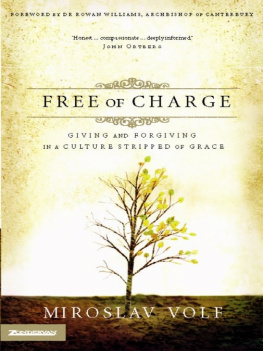
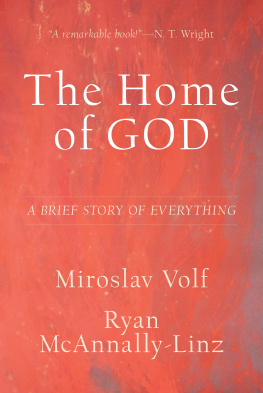
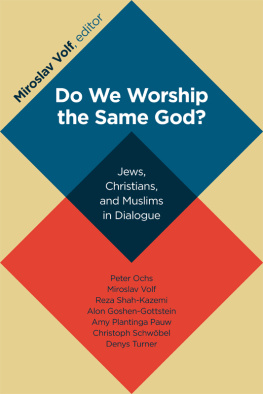
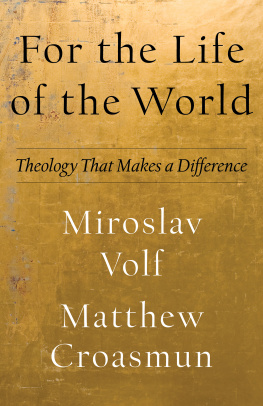

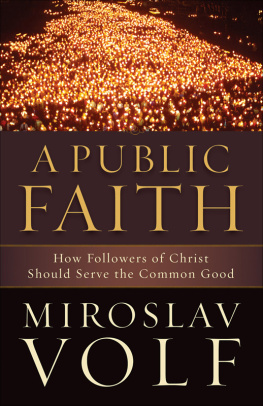



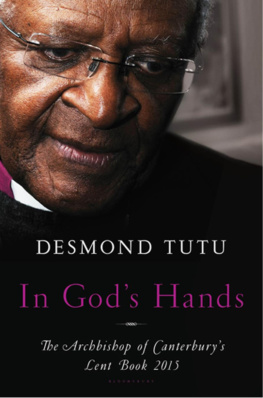

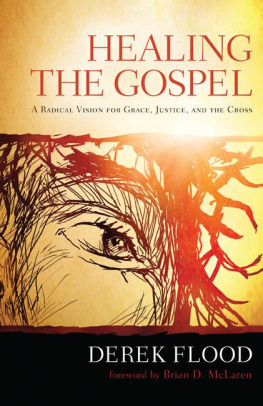


 19 18 17 16 15 14 13 12 11 10 9 8 7 6 5
19 18 17 16 15 14 13 12 11 10 9 8 7 6 5